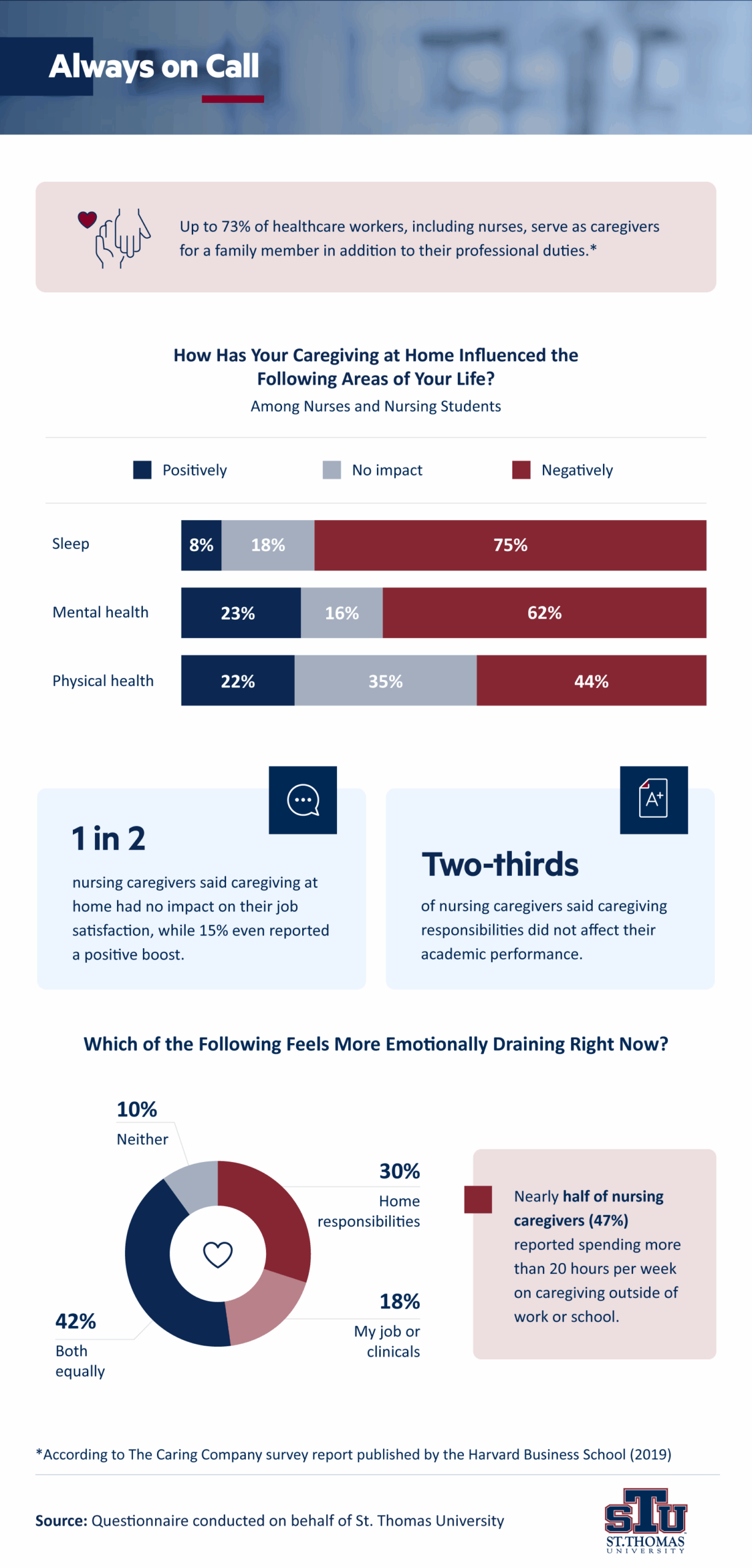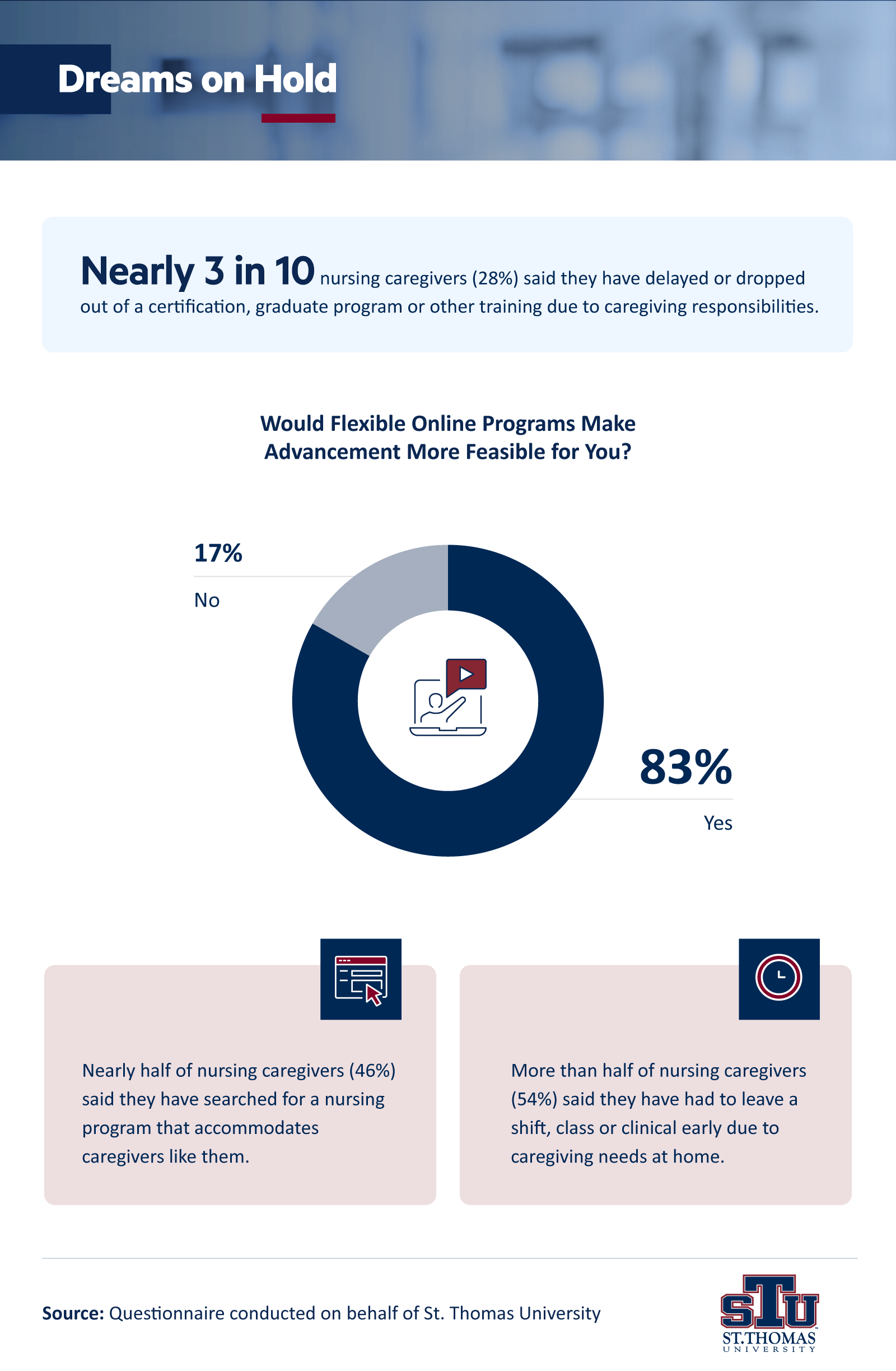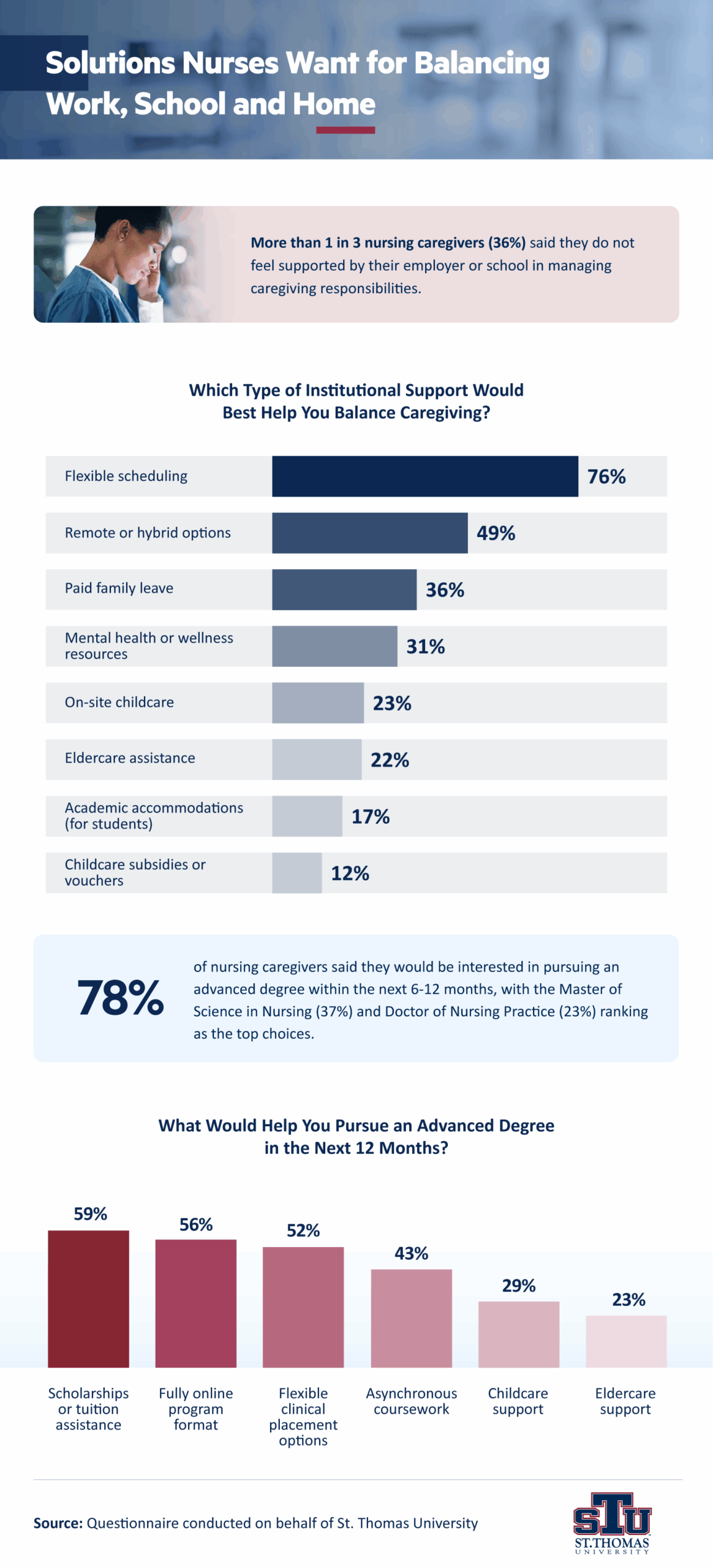
Nurses are often seen as the backbone of healthcare, yet many also carry a second, invisible responsibility at home — providing care for children, aging parents or other loved ones. These dual roles add layers of complexity to their professional and academic journeys, influencing well-being, career decisions and opportunities for growth.
To better understand these challenges, a questionnaire of 185 nurses and nursing students was conducted on behalf of St. Thomas University (STU). This research explores the realities faced by nursing caregivers and how these responsibilities shape their experiences in the workplace and in the classroom. By identifying these trends, STU contributes to ongoing discussions about how schools and employers can better support nurses who pursue advanced education while caring for their families.
Key Takeaways
- 47% of nursing caregivers report spending more than 20 hours per week on caregiving outside of work or school.
- 28% of nursing caregivers have delayed or dropped out of a certification, graduate program or other training due to caregiving responsibilities.
- 53% of nursing caregivers said their home caregiving responsibilities have affected their ability to perform or focus.
- 36% of nursing caregivers do not feel supported by their employer or school in managing caregiving responsibilities.
Balancing Shifts and Family Care
Nursing already demands long hours, physical stamina and emotional resilience. Adding caregiving at home significantly increases the burden, leaving many nurses stretched thin.

Nearly half of nursing caregivers (47%) reported spending more than 20 hours each week on caregiving outside of work or school, with the average reaching 25 hours. This commitment often competes with the time and energy needed to excel in demanding healthcare roles or further education.
The strain is evident in professional outcomes. More than half of nursing caregivers (53%) said their responsibilities at home affected their ability to perform or focus. For many, this meant showing up to work emotionally and physically drained, with limited capacity to balance both sets of duties effectively.
The impact extends beyond job performance. Nearly three in five respondents (59%) said they had considered switching to a less demanding role or leaving healthcare altogether. Yet not all effects were negative. While 43% reported caregiving made it harder to pursue further education or training, 21% said it positively motivated them in their studies.
When Caregiving Delays Education and Career Goals
Education is a critical pathway for nurses seeking to advance in their careers, but caregiving often slows or derails those plans. Nursing caregivers share what could help them succeed.

Twenty-eight percent of nursing caregivers said they delayed or dropped out of a certification, graduate program or other training because of their caregiving responsibilities. For one in four, the delay lasted five years or more, representing a significant interruption in professional growth.
The struggle also carried an emotional weight. Four in 10 respondents admitted feeling guilty for pursuing their career while caring for others, while 35% hid their caregiving responsibilities from managers or instructors to avoid being judged or penalized. Without greater flexibility and understanding, nursing caregivers may continue facing unnecessary barriers to advancing their education and careers.
How Institutions Can Help Nursing Caregivers Thrive
While many nurses are committed to advancing their education, they need stronger institutional support to succeed.

More than one in three nursing caregivers (36%) said they did not feel supported by their employer or school in balancing caregiving duties. A majority (61%) also believed nursing schools were not accommodating enough for students with caregiving responsibilities.
Despite these challenges, many nurses expressed a strong interest in furthering their education. Nearly four in five (78%) said they would be interested in pursuing an advanced degree within the next six to 12 months, with a Master of Science in Nursing (37%) and Doctor of Nursing Practice (23%) cited as the most popular goals.
The Way Forward for Nursing Caregivers
Nursing caregivers shoulder the dual responsibility of caring for patients and supporting loved ones at home, often at the cost of time, career progress and personal well-being. The questionnaire revealed these challenges but also highlighted nurses’ strong commitment to education and professional growth. With flexible, caregiver-friendly pathways, institutions can help nurses continue advancing their credentials while balancing family responsibilities, ensuring they remain not only in the profession but also equipped to thrive within it.
Methodology
A questionnaire of 185 nurses and nursing students was conducted on behalf of STU to explore how caregiving responsibilities outside of work impact their lives. Among respondents, 68% were practicing nurses, 27% were nursing students and 5% identified as both. To qualify, participants had to be either a nurse or nursing student who also provides care for children, partners or aging family members. Data was collected in September 2025. This is a non-scientific, exploratory questionnaire and is not intended to represent all nursing caregivers or students.
About St. Thomas University
St. Thomas University offers a variety of online degree programs designed to support working professionals. For those interested in advancing their nursing career, STU’s online Accelerated Master of Science in Nursing (MSN) program provides a flexible, high-quality pathway that accommodates the realities of modern caregiving. Students gain the skills and knowledge to take on leadership roles in healthcare while balancing their personal responsibilities.
Fair Use Statement
The information in this article may be used for noncommercial purposes only. If you share it, please include a link to St. Thomas University with proper attribution.